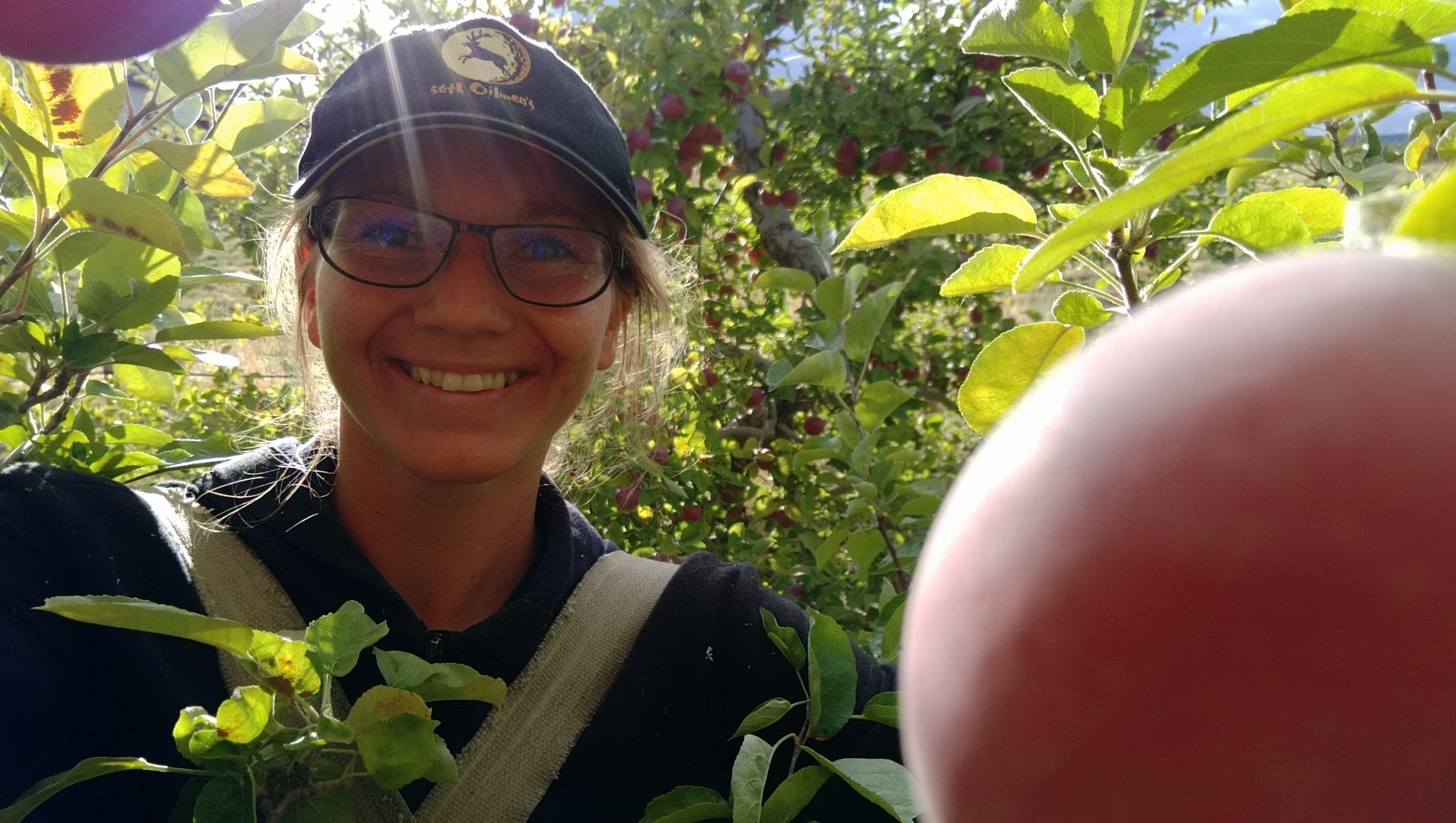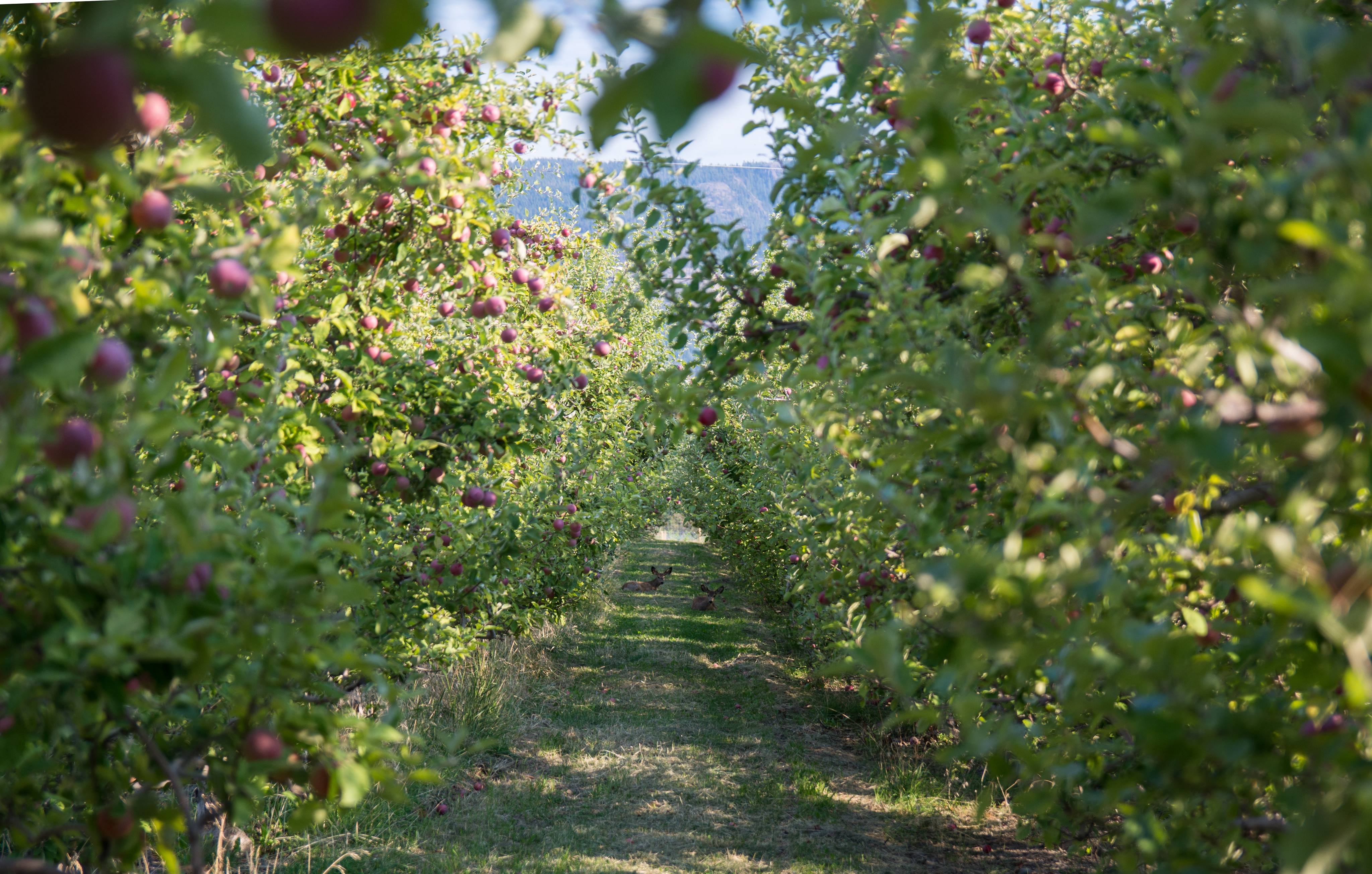I met Daria when I was living in Wrocław for a year, just before my departure to Canada. Although the planning of my trip was already quite advanced, I didn’t really talk with others about my crazy plans. I shared them with Daria. Her positive attitude made me feel that what I’m doing is not as crazy as I thought 🙂 I told her about my idea of crossing Canada hitchhiking. After some talks in the kitchen about my travel plans, Daria was also convinced that Canada could be great destination. I focused on traveling, she also found job there.
In the interview below she is talking about her application for International Experience Canada, how she found her dream job in a cidery and whether she will come back to Canada.
Aga: Why did you decide to come to Canada on the International Experience Canada program?
Daria: First, I had a very casual idea to go to Canada. Out of pure curiosity and probably because I used to study or work abroad – in the European Union. And slowly there was a readiness for something a bit more distant, trying my hand at a completely different context. And Canada is attracting by nature and stereotypes. That’s when a new flatmate moved into our flat in Wroclaw, her vision of Canada was definitely more advanced – she already had a visa in her pocket. And so much advice and patience up her sleeve! A nod towards you, Aga!
A: What the process of applying looked like?
D: I filled out the application right after the pool was opened and I think that at the end of January I got an e-mail with Invitation to Apply and that for delivery of documents “starting now”! I was lucky enough to be working in Spain then – if I remember correctly, you must provide a police certificates from every country where you spent more than 6 months in total. In addition, the document on the Spanish side must be properly sealed by two or three different institutions to be considered reliable and accepted. It was a race against time, the more that the document had to be translated by a professional, and the last “stamp-maker” – the Ministry of Foreign Affairs – stated that documents can’t be sent abroad (to Poland). The tension was high, Spanish people are not famous for the organization, but they did it! The letter came to me after about two weeks, it was electronically sent to Poland and translated right on time. The rest of the necessary documents have been collected remotely (with the help of third parties) and thanks to that a year later I could start a Canadian adventure.
A: What did you know about Canada before arrival?
D: You definitely have a lot of pictures in your head, because magical views always decorate reportages or, more prosaically, tempting promotions of cheap flights. I also got a very good book from my friends on birthday about Canada – a book that is incredibly helpful in preparing for a trip to this rather different culture. It is worth being prepared for the local historical and social contexts, identity is not an easy topic, and Europe plays a specific role. It’s good to prepare for it, then it will be easier for you to have interesting conversations with people living here.
Besides, I knew it was quite cold here, so I bought expensive jacket for a temperature of -50 degrees Celsius 🙂 It should last a lifetime!
A: What were your first moments in Canada? What did you have to do to work legally in Canada?
D: If I remember correctly, the first point of the bureaucracy was arranging local tax number, already at the airport I got information where to go to get it. It seems it was a Canada Service or something similar. Regarding the documents, one piece of advice: read the Work Permit carefully mentioned in your passport, from A to Z. It’s not just checking the typos in the surname or until the permission is valid, you need to read everything. As you are still in the area of “Immigration“, you can correct it. If you find a mistake after the fact, you will need to send the original to Ottawa and the waiting time for the corrected document is about 2 months. Because of that it could be a bit difficult to find job immediately…
A: How did you search for a job? Did you use any specific websites?
D: I used Indeed the most – there are also job offers published on other, more local websites. Thanks to this website I finally found a job published locally, but captured by this larger, global search engine for jobs. A lot of offers are also published on the LinkedIn portal, I think it’s worth having there well-prepared profile.
A: Did you wait long for an answer from employers?
D: Yes and no. Of course, being in Canada, we start sending a CV as we already have a local phone number. After two days of sending a resume I had already arranged several phone calls. They are often quite long – from 10 minutes to 50. You have to go through several stages of recruitment, often arrange for video calling, etc. In general, before making the final decision, the company seeks to meet face-to-face. It seems to be like that by office/corporate jobs.
In the end, I got job after one long telephone conversation then we confirmed by e-mail that we were interested in working together. Unlike the tedious traditional recruitment, it was also the work of dreams, not just another step in a career path.
A: What is the difference between an application for a job in Canada from that in Poland?
D: We have different CV templates and you have to accept that and modify it, it’s not just a matter of missing a photo. If you are looking for a job with foreign languages, you have to go through time-consuming language tests and tasks.

A: How did it happen that you started working in the cidery?
D: After almost a month in Montreal, I finally got a job – a corporation, a position with Spanish. It wasn’t easy because I don’t speak French, but when I finally managed it, it turned out that instead of being happy, I was totally confused. Even unhappy. Because I came to Canada to experience something new and different. I did not want this year to resemble my earlier versions of life. I returned to “home” – I spent a whole month in Montreal on various local couches, Couchsurfing proved to be great. These people were an amazing mine of knowledge and inspiration, you just have to listen. I came back that day home and talk to the girl I stayed with, she suggested – maybe BC? People from Quebec always go there in the summer to pick fruit, etc. It was still March, the time maybe not quite optimal for this type of work, but why not look around, I don’t need to start right away, I could travel a bit first.
And then, somehow, I came across this dream job offer – a cidery. I am a big fan of cider, and the motivation and emotions reached the zenith. The fact that the offer was from two weeks ago a bit cool down all the emotions, but time hasn’t played here against me. I presented myself nicely as a cider lover & working traveler and I got an interview by phone. Then we exchanged two emails and the next day I bought a ticket for the west coast, I was supposed to start three weeks later. Getting this job I celebrated with dignified dinner with potato pancakes, cider – so far from Quebec – and chocolate mousse, which smelled of roses.
A: What did you like the most about this job?
D: I worked for amazing people. And, the work itself was very diverse – first there were a lot of tasks in the orchard. It was associated with a very pleasant physical tiredness at the end of the day and the operating of super cool tractors, mowers and other equipment that always intrigued me. It’s nice sometimes to work on something that you can see with your own eyes and feel in your bones. After opening the cidery, I became the person responsible for the tasting room, that is, the reality has become a bit different – first of all, it was contact with customers, a story about us, about our cider and history. The perfect place to work on English! But thanks to the fact that I was also involved in the work in the orchard and cidery – where the cider master always dedicated a lot of time to me and talked about what we are doing now and why – I could always tell customers different secrets of production and show our facilities. I think it was a very authentic experience for both me and the guests. And it all happened in beautiful British Columbia among wonderful people fascinated by the truest cider. Paradise!

A: Will you talk briefly about the production of cider? Was something that particularly surprised you?
D: It’s a long story! Surprise for me was for example, that there were different kinds of apples that are used for the production of cider and which are often far from being tasty. In the autumn, we squeezed the juice from various types of apples and we started fermentation, see this process from scratch and being part of it is a unique experience. I already had the rest of the production behind me – eg carbonation, various measurements, bottling, pasteurization, etc. We have already done it many times since May, only to squeeze the juice and know the apples themselves, I had to wait until October.
A: How do you perceive Canadians?
D: Generalizing: very friendly and helpful people. And they are a bit happier and they do not really complain! You can learn a lot from them.
A: What do you like most about Canada?
D: The most … hard to balance. Because it’s a world of completely different qualities, so quite a lot of things I like. But maybe I will say nature and great bike routes that you can really envy and for which I will miss Canada so much! Outdoor activities is so natural for Canadians, and they have great conditions hto stay active.
A: You have experience of working in different countries, how does Canada look like in terms of work conditions?
D: From what I know, you don’t always have a written contract of employment, which doesn’t mean that you work illegally. Taxes are paid but you have just a word contract. And a typical scene from American movies – someone gets fired, puts everything in a cardboard box and leaves – it could also happen here because no notice period applies. You can leave or get fired overnight.
A: Are there things that bother you in Canada?
D: Prices do not spoil! Distances also not …
A: How did you deal with the high costs of living, there are ways to reduce them?
D: As soon as we move somewhere, it is worth giving yourself some time to get to know the prices and compare them in different supermarkets. Normal prices and special offers work here quite strangely: you can buy the same thing, for example, cheese, for a dollar or for 9. The prices aren’t always so different, but it happens. In all-dollar-type stores, you can buy a few food products at more affordable prices than in supermarkets, for example, spices, rice. And in summer, it’s worth buying vegetables or fruits at the local farmer’s market – better prices and delicious local products. A very useful place is the second-hand shops – for a small amount of money we can dress, decorate a flat, or spend small amounts of money on entertainment, such as board games or various items.
And after the arrival, it is worth taking a moment to choose the best mobile networks available, because with this decision we will live for a long time. Prepaid rarely pays off, there is usually a mandatory activation fee (about 20 $), and if you want to have an Internet connection or do not pay for incoming calls (important when there are many phone interviews), the mobile plans may be the most advantageous (to sign you may need a passport with a visa). Often, ordering a sim card via the Internet releases us from the activation fee, it is worth checking.
People who are used to traveling and getting to know people by Couchsurfing should be very happy here – Canadians are very hospitable and open to invite us – “newcomers” – into their world and getting to know their friends. I was very lucky and I met really many cool people in this way.
And the cheapest means of transport is probably a bike – just don’t save on the helmet.
A: Is there anything that you would advise people before going to Canada?
D: If you have a driving license and you are afraid to ride – practice before going overseas to feel a bit more confident. North America distances and relatively sparse (especially after the suspension of the Greyhound in most of Canada) public transport can get you to the car rental, especially if you want to be efficient in traveling, and you’re not brave enough to hitchhike.
A: Would you generally recommend Canada to others?
D: Definitely yes. The opportunity to work and the time that we can spend here give us great freedom, you can earn as well as spend your dollars on small and large trips, there are lots of possibilities, we only have to decide and act. Canada is a beautiful country. I haven’t managed to cross whole Canada like you, but I can always come back here as a tourist. And I think I will come back more than once.
Thank you Daria for the interview and for sharing your valuable advice and experience!

You can read more about the International Experience Canada program here. More about my trip across Canada you can find here.






